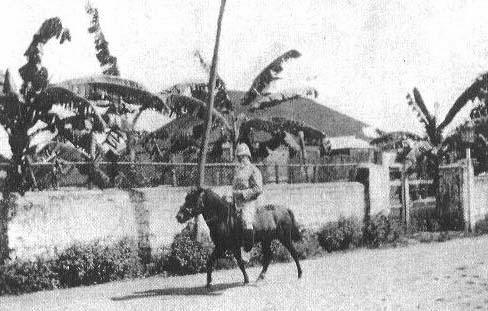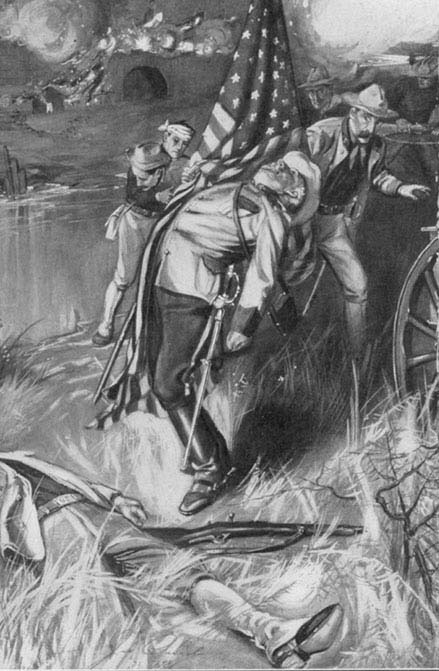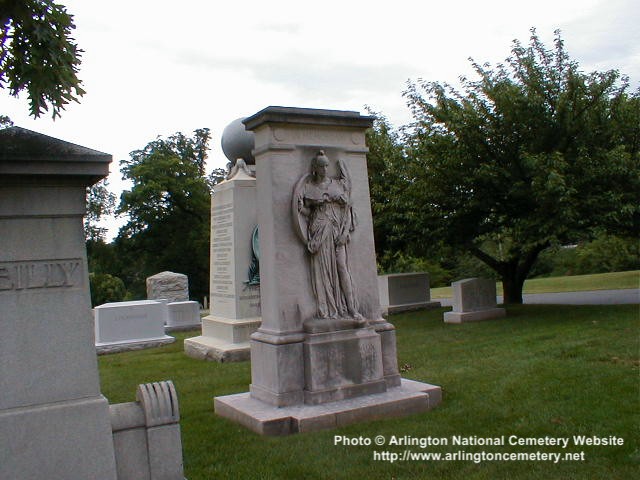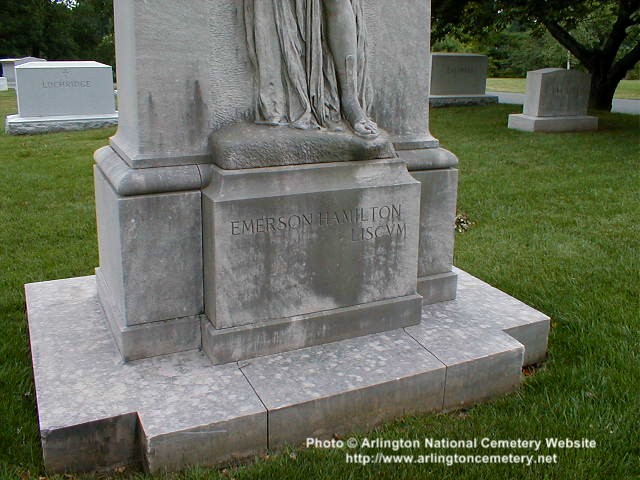Emerson Hamilton Liscum of Vermont
Corporal, Company H 1st Vermont Volunteer Infantry, 2 May to 15 August 1861
Private, Corporal, Sergeant and First Sergeant, Company E and Company A, 2nd Battalion, 12th United States Infantry, 1 February 1862 to 22 March 1863
Second Lieutenant, 12th United States Infantry, 19 February 1863
First Lieutenant, 4 May 1863
Regimental Quartermaster, 5 February to 16 October 1865
Transferred to 30th United States Infantry, 21 September 1866
Captain, 25th United States Infantry, 28 July 1866
Unassigned 26 April 1869
Assigned to 19th United States Infantry, July 1870
Major, 22nd United States Infantry, 4 May 1892
Lieuitenant Colonel, 24th United States Infantry, May 1896
Brigadier General, United States Volunteers, 12 July 1898
Honorably Discharged from the Volunteer Service, 31 Decembere 1898
Colonel, 9th United States Infantry, 25 April 1899
Brevetted Captain, 1 August 1864 for gallant service in the battle of Bethesda
Church and during the campaign before Richmond, Virginia
Killed 13 July 1900 at the battle of Tientsin, China
From Spanish-American War Report:
Lieutenant Colonel Emerson H. Liscum of the Tenty-fourth Infantry, who was wounded (battle ofSantiago, Cuba), began his military career in the ranks. He was born in Vermont and in May 1861 entered the volunteer army as a Corporal inthe First Vermont Infantry. He took his discharge however within three months. On February 1 of the following year he enlisted as a Private in the Regular Army and was assigned to the Twelfth Infantry. He passed through the grades of Corporal, Sergeant and First Sergeant in his regiment within a year and on March 22, 1863 he received a commission as a Second Lieuenant in his regiment. Two weeks later he was advanced to the rankof First Lieutenant. On September 21, 1866 he was transferred to the Twentieth Infantry and on July28 of the same year was appointed a Captain in the Twenty-fifth Infantry. He was assigned to the Nineteenth Infantry in July 1870 and on May 4, 1892 was promoted to Major and transferred to the Twenty-second Infantry. He was advanced to the rank of Lieutenant Colonel May 23, 1896 and transferred to the Twenty-fourth Infantry. On August 1, 1864, while a Lietuenant in the Twelfth Infantry, he wasbreveetted Captain for gallant services in the battle of Bethesda Church and during the campaign before Richmond.
In the meantime, foreign dignitaries and missionaries (including Americans) were being subjected to the terrors of a rebellion in China.
The 9th Infantry was one of only two American units chosen to protect American interests in China. After landing at Taku Bar, the Regiment began the trek towards Tientsin under the direction of the Regimental commander, Colonel Emerson H. Liscum.
The assault on Tientsin began on the morning of 13 July 1900, a day that is deeply engraved in the memory of the entire Regiment. At approximately 0900 hours on that day, the Regimental Color Sergeant, Sergeant Edward Gorman, who was standing beside Colonel Liscum, was severely wounded by the intense fire. Colonel Liscum had been struck in the shoulder but he gallantly seized the Colors from the fallen sergeant, stood fearlessly holding them erect and continued-to direct the assault on the city walls in the face of murderous fire. A few moments later, the Colonel fell mortally wounded and shortly after directing his men to “Keep Up The Fire Men,” he died. The regiment remained pinned down by the fierce Boxer fire for the rest of the day, and at dusk was ordered to retreat by General Dorward, the British commander of the multi-national task force. The assault was resumed the next day and the Japanese Infantry broke through the city gate and the city fell.
The Regiment participated in another engagement at Yang-Tsun and then participated in the assault on Peking. The Fighting Ninth was the first unit to break into the forbidden city and, after the fall of Peking, a sentry of the Ninth remained on guard at the entrance to the forbidden city for almost one year until the Regiment was withdrawn in mid-1901.
As a result of their exemplary performance during this campaign,, the Regiment was awarded the honorary title of “Manchus,” earned its foremost trophy, the Liscum Bowl, and its motto, “Keep Up The Fire.”
MRS. EMERSON H. LISCUM
ELMIRA, New York- December 25, 1933 – Mrs. Mary May Gibbons Liscum of this city and Washington died at her Summer home, Willowbrook, here early this morning. Widow of Colonel Emerson H. Liscum, U.S.A., who was killed in the BoxerRebellion, she was a member of one ofElmira’s oldest families.
LISCUM, EMERSON H
- COL 9TH US INF
- VETERAN SERVICE DATES: Unknown
- DATE OF DEATH: 07/13/1900
- DATE OF INTERMENT: Unknown
- BURIED AT: SECTION E DIV SITE 843
ARLINGTON NATIONAL CEMETERY
LISCUM, MAY D W/O EMERSON H
- DATE OF DEATH: 12/25/1933
- DATE OF INTERMENT: 12/28/1933
- BURIED AT: SECTION EAST SITE 843
- ARLINGTON NATIONAL CEMETERY
- WIFE OF EH LISCUM – COL 9TH US INF
Michael Robert Patterson was born in Arlington and is the son of a former officer of the US Army. So it was no wonder that sooner or later his interests drew him to American history and especially to American military history. Many of his articles can be found on renowned portals like the New York Times, Washingtonpost or Wikipedia.
Reviewed by: Michael Howard




